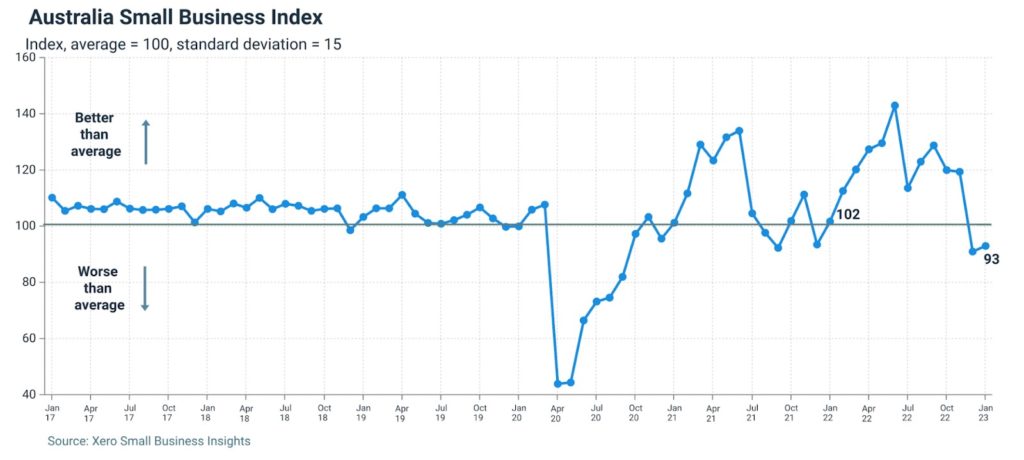- Xero’s Small Business Index fell 26 points, amid slower sales, jobs growth and wages.
- A slowdown in sales will put pressure on small businesses recovering from the pandemic.
- This then flows through to their capacity to increase wages and attract staff, Xero said.
Small businesses are starting to bare the brunt of higher prices with new data showing the cost of living is now starting to hit their customer’s hip pockets.
According to Xero’s Small Business Index, Australia’s small business economy has taken a hit as the Index fell 26 points since November, amid slower sales, jobs growth and wages.
The Index measures data from hundreds of thousands of small businesses in the country, and tracks four sub-metrics: sales, wages, jobs growth, and the length of time small businesses wait to be paid.
Sales growth, which was 11.1 per cent year-on-year in November, fell to 7.2 per cent in January. Jobs growth slowed down to just 1.6 per cent, down from 2.8 per cent in December, and the time-to-be-paid metric rose 0.6 days to 23.8 days, which is the longest time since September 2020.
Wages rose just 2.9 per cent in January, down from a peak of 4.7 per cent in September 2022 and just below the long-run average of 3 per cent.
Feeling the pinch
Country Manager of Xero Australia, Will Buckley said, “This latest data from our Index shows that Australian small businesses are beginning to feel the impact of cost of living pressures on their customers.
“We are seeing a slowdown in sales that will be putting pressure on small businesses who are recovering from a demanding few years. This then flows through to their capacity to increase wages and attract staff” he said.
Xero Economist, Louise Southall said that wage increases for small businesses are not as large as they were last September.
Ms Southall said, “While this may provide some short term relief for small business owners who struggled with balancing above average wage increases and rising costs during 2022, it may result in consumers having less disposable income to feed back into small businesses in the medium term.
More being paid for arts and recreation
The Xero data shows that sales growth was led by arts and recreation (+17.1 per cent) and hospitality (+15.7 per cent), which is unsurprising during holiday months. The weakest two industries in January were rental, hiring and real estate (-2.5 per cent) and retail sales (+0.6 per cent).

Sales grew in all states, but the softest sales result was in Tasmania (+3.3 per cent). Queensland (+2.8 per cent) and South Australia (+2.2 per cent) were the only two states to record jobs growth above 2 per cent in January.
Pay on time
Mr Buckley said it was critical that bigger businesses pay their invoices on time as the length of time small businesses waited to be paid rose 0.6 days to 23.8 days in January.
While late payments also rose 1.2 days to 7.7 days – the highest since July 2020.
Mr Buckley said, “At a time when small businesses are facing numerous economic headwinds, it is crucial for bigger businesses to be paying their invoices on time.
“If any small business is starting to feel a cash flow squeeze, I encourage them to speak to their advisor and establish a plan for the coming months” he said.









